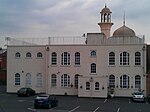St Andrew's is an association football stadium in the Bordesley district of Birmingham, England. It has been the home ground of Birmingham City Football Club for more than a century. From 2018 to 2021, it was known for sponsorship reasons as St Andrew's Trillion Trophy Stadium.Constructed and opened in 1906 to replace the Muntz Street ground, which had become too small to meet the club's needs, the original St Andrew's could hold an estimated 75,000 spectators, housed in one grandstand and a large uncovered terrace. Between 1906 and 1939 it was reported that a lot of construction work took place inside the ground and the official capacity was set at 68,000 at the start of the 1938-39 season. The attendance record, variously recorded as 66,844 or 67,341, was set at a 1939 FA Cup tie against Everton. During the Second World War, St Andrew's suffered bomb damage and the grandstand, housing a temporary fire station, burned down in an accidental fire. In the 1950s, the club replaced the stand and installed floodlights, and later erected a second small stand and roofed over the open terraces, but there were few further changes.
The ground became dilapidated: a boy was killed when a wall collapsed during rioting in the 1980s. When new owners took the club out of administration in 1993, they began a six-year redevelopment programme during which the ground was converted to an all-seater stadium to comply with the Taylor Report into safety at sports grounds, and all areas apart from the Main Stand were completely rebuilt. The seating capacity of the modern stadium is 29,409. It has function rooms suitable for business or social events and a club store selling Birmingham City merchandise. A 2004 proposal that the club should sell the ground and move into a multi-purpose City of Birmingham Stadium came to nothing. In 2013, the ground was listed as an Asset of Community Value under the Localism Act 2011.
St Andrew's has been the venue for England international football matches at all levels below the senior national team, and for semifinal matches in the FA Cup and finals of lesser competitions. It was also used as Coventry City's home ground for the 2019–20 and 2020–21 seasons. It has played host to events in other sports, including rugby union and professional boxing, and more recently has staged music concerts.







